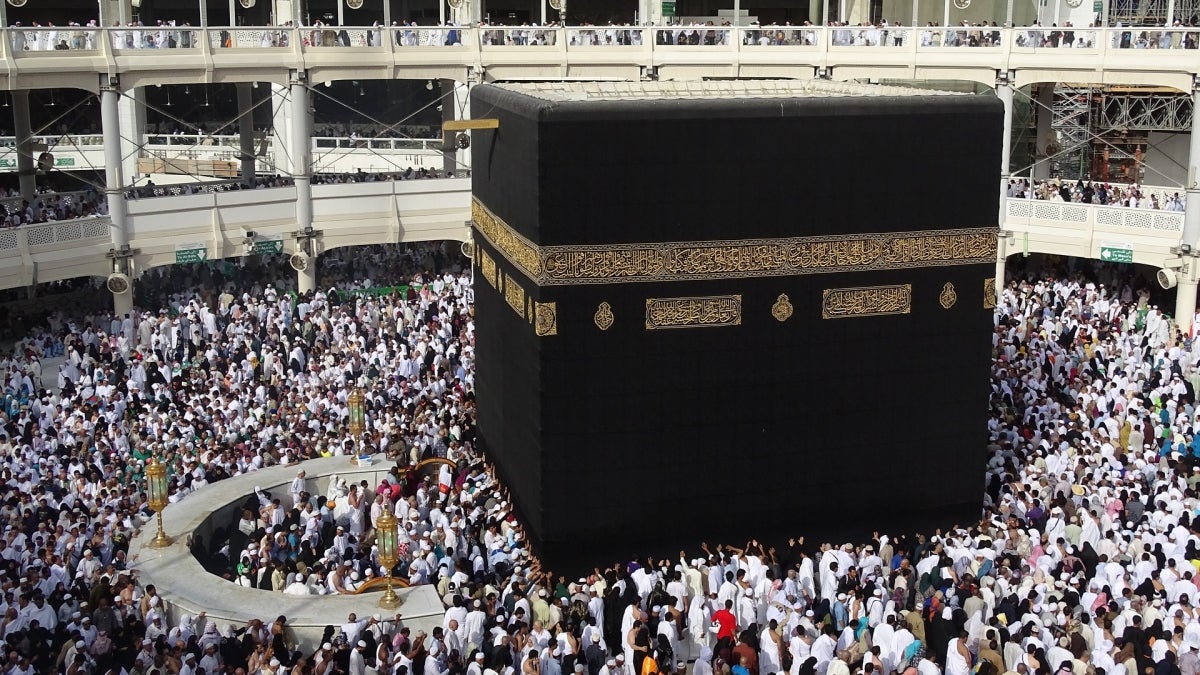Last year, more than 2,400 people were trampled during the annual Muslim pilgrimage to Mecca, called the hajj. Security concerns abound, as 27,000 security personnel have been hired for the event.
This is the context in which Saudi Arabia, home to Mecca, has accused Iranians of not being true Muslims, and in turn, Iranians have accused Saudi Arabia of murdering the more than 400 Iranians killed during the pilgrimage last year. Throw in a heavy dose of proxy wars in Yemen and Syria, and tensions are high.
This year's pilgrimage starts Friday.
Chad Haines is a professor of religious studies and in global studies on Islam, modernity, postcoloniality and globalization. He is an affiliated faculty member with the Center for the Study of Religion and Conflict and the Center on the Future of War. He described a little bit about the hajj and explained some of the controversies that have surrounded it in the past few years.
Question: What is the hajj, and why is it significant in Islam?
Answer: Hajj is a pilgrimage to Mecca, in Saudi Arabia, that honors the same journey the Prophet Muhammad took in the final year of his life. Hajj is a means of communicating with the divine, of opening one’s heart through a series of intensive rituals over a number of days.
By going on hajj, Muslims are affirming the significance of the Prophet Muhammad as the messenger of God in their faith, entering into dialogue with 1,400 years of Islamic history and all those who performed the rituals before. The hajj connects Muslims with ancient Jewish and Christian ideas and practices, as some of the rituals of hajj affirm the three traditions’ shared deep faith of the Prophet Abraham.
The hajj is the ultimate gathering place of Muslims, and every year several million Muslims perform the hajj as one assembly. One meets people from all over the world: Saudis and Egyptians, Chinese and Malays, Americans and Turks, Malians and South Africans. One sees the incredible diversity of Islam, the extensive poverty of the vast majority of Muslims, and the depth of faith as people, old and young, in wheelchairs and pushcarts, walk miles and miles to complete the proscribed rituals.
Q: What's the basic rundown of the controversy between Iran and Saudi Arabia? Why does this matter in Islam?
A: The conflict between Iran and Saudi Arabia today over hajj is based on current geopolitics and the bombing of Yemen and Iranian supported forces by Saudi Arabia, as well as the chaotic and inhumane violence that is today happening in Syria and Iraq, where both regimes, and a plethora of others, are fighting proxy wars.
For the vast majority of Muslims, the pronouncements of the government-appointed head cleric of Saudi Arabia, ‘Abd al-Aziz Al Shaikh, are irrelevant and have no bearing on their beliefs and practices. There is no single authority who defines Muslim beliefs. The claim to “one true Islam” by any nation or cleric counters Islamic scholarship and global agreements that affirm eight different legal schools within Islam, Shiite interpretations — that is, the interpretation practiced in Iran and parts of Iraq being one.

Chad Haines
Q: Can you talk a little more about the changes Saudi Arabia is making to Mecca?
A: The Saudis are slowly changing many of the rituals and experiences of Muslims who go on the pilgrimage. In addition to destroying historical sites as part of the reconstruction of the mosque in Mecca and building shopping malls and five-star hotels, they have imposed a class-based system for access to the city and Ka’ba. The space around the Ka’ba has historically been accessible to all Muslims, regardless of religious orientation, nationality, wealth or gender.
Saudi Arabia is also making it more difficult for women to perform the ritual circumambulation of the Ka’ba and say their formal prayers in front of their holiest of shrines. These transformations are not expressions of the holistic, inclusive Islam that was first practiced by the Prophet Muhammad when he performed hajj. It is the commercialization and commodification of hajj that many Muslims are protesting against, not just Shiite Muslims.
Hajj is a religious ritual, and though from time to time some people attempt to make it political, for the vast majority of Muslims it is a personal and communal act that transcends nations, states and politics, which is why many Muslims are calling for the Saudis to surrender Mecca and Medina to a governing council overseen by diverse states of the Muslim world before they destroy the holy cities completely.
Q: Why would any of this matter to the U.S.?
A: It has no bearing on the U.S., except that it exposes the U.S.’ own hypocrisy in the Middle East region today. In Yemen, the U.S. is supporting and arming the Saudi military to fight Shiite militias, some of which are supported by Iran. In Iraq, the U.S. is aligned with the Shiite government, also supported by Iran, to fight against ISIS. That is, in one place we are fighting a proxy war against Iran while simultaneously in another country fighting a war as allies of Iran.
More Arts, humanities and education

Different ways of thinking, different ways of thriving: How ASU is supporting students with autism
According to the CDC, over 5.4 million adults in the U.S. are living with autism spectrum disorder, a condition that affects…

Forever sewn in history
The historical significance of Black influence on fashion spans centuries. From the prints and styles of Africa to various…

The Poitier Film School hosts Emmy-winning ‘Shōgun’ costume designer Carlos Rosario in LA
The Emmy and Golden Globe award-winning blockbuster FX series “Shōgun” doesn’t just have audiences in its thrall, but the…
